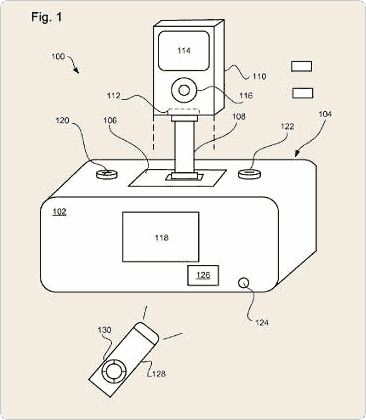iPod Boombox
Although Apple was forced by poor sales to pull the iPod Hi-Fi from store shelves in September, a new US patent published on Thursday shows the electronics maker still exploring its own speaker accessories.
Named the iPod Boombox in the patent and in earlier trademarks, the audio system borrows the shape of the now discontinued Hi-Fi but embeds a screen or control system at the front. In screen form, the change would allow the Boombox to play video from a docked iPod as well as sound.
A receiver on the front would also allow remote control alongside volume buttons on the top of the system.
As with most of Apple's patent filings, the company is not under obligation to use the technology even if the patent is later granted.
Apple's iPod Boombox patent drawing (courtesy of MacNN)
Wireless ordering and lockdown system
A second patent published the same day, for a wireless communication system, allows for special transactions to occur when an Apple device comes in contact with wireless networks.
In the new implementation, a handheld or similar hardware automatically identifies itself to the local network, triggering an order to a remote system that queues up and processes requests based on their priority. The technique could be used to notify a device user exactly when coffee is ready at a restaurant or push ads in certain locations, Apple explains in one example.
The description bears some similarity to Apple's Starbucks service, which automatically cues a Starbucks option on an iPhone, iPod touch, or iTunes program when its user is connected to a hotspot run by the coffee shop.
However, the invention may also be used to remotely shut down a device, the company says. In the event the equipment is lost or stolen and either Apple or another organization is aware of the incident, the hardware identifier could be used to warn any unwanted owners or lock the device outright, preventing data theft and encouraging its return.
The patent appears to address concerns raised by large businesses, which have been told to avoid the iPhone by analysts due to the lack of remote administration present on RIM BlackBerries, Palm Treos, and most other work-oriented smartphones.
Code injection anti-piracy system
One of Apple's additional patents revealed on Thursday focuses only on software, according to a report from MacRumors.
Dubbed a Run-Time Code Injection to Perform Checks, the software patent would let a program's developer trigger the installation of new code that approves the use of a program with the user's hardware. If the hardware changes, the code could disable a given copy even after it has been approved elsewhere.
Copy protection could thus be in place without relying on hardware dongles or other local copy protection systems, many of which are largely ineffective, Apple says.
The anti-piracy method can potentially run every time a program is active and appears to vary sharply from Microsoft's Windows Genuine Advantage, which is usually only invoked upon installing a new program or specific software updates.
Auto-shutdown system for handhelds, Macs
Lastly, an additional patent for a host device shutdown system could aid Apple's reputation for environmental friendliness while aiding users.
Software on both a host computer and a portable device, such as an iMac and an iPod, could be set to automatically sleep or shut down either system when certain conditions are met, such as a full battery. Owners could leave a system running overnight to charge an iPod knowing that it would shut off on its own while also preventing the attached device from continuing to draw unnecessary power.
 Katie Marsal
Katie Marsal







-m.jpg)






 Wesley Hilliard
Wesley Hilliard
 Christine McKee
Christine McKee
 Malcolm Owen
Malcolm Owen
 William Gallagher
William Gallagher
 Andrew Orr
Andrew Orr







-m.jpg)




17 Comments
The patent appears to address concerns raised by large businesses, which have been told to avoid the iPhone by analysts due to the lack of remote administration present on RIM BlackBerries, Palm Treos, and most other work-oriented smartphones.
I can understand why an overly configurable 'open' device can be tied in knots and will need a tech to straighten it out but given the original iPhone release is still closed why is lack of remote admin an issue?
Maybe Analysts should stick to making unrealistic observations than giving bad advice
McD
I can understand why an overly configurable 'open' device can be tied in knots and will need a tech to straighten it out but given the original iPhone release is still closed why is lack of remote admin an issue?
Maybe Analysts should stick to making unrealistic observations than giving bad advice
McD
This has nothing to do with the device being open or not, it is about data security. Anyone who gets their hands on your iphone will have access to your contacts, schedule, email, etc. Other smart phones have a way to remotely lock them and/or wipe the memory if they are lost.
The software patent would let a program's developer trigger the installation of new code that approves the use of a program with the user's hardware. If the hardware changes, the code could disable a given copy even after it has been approved elsewhere...
The anti-piracy method can potentially run every time a program is active.
So if you replace your computer (or change out your hard drive or update your RAM?) you'll have to contact a hundred or more developers to get them to unlock the software you bought? This is nuts.
Regarding iPod Boombox news: Apple answered a prayer. Good.
Apple should stay out of the speaker business. Wasn't the last overpriced embarrassment enough?